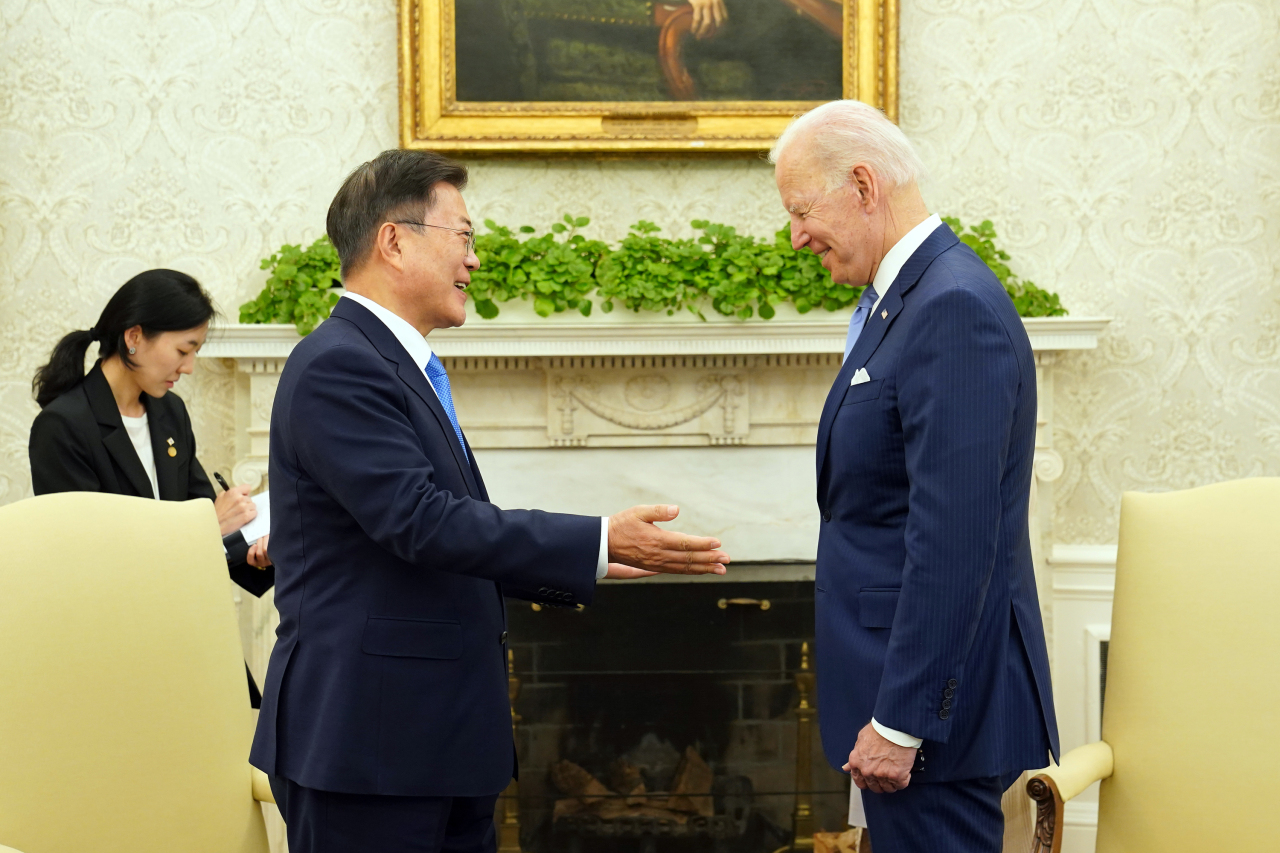 |
South Korean President Moon Jae-in (left) holds talks with US President Joe Biden at the Oval Office of the White House in Washington on Friday. |
President Moon Jae-in and US President Joe Biden agreed at their summit Friday to pursue a global COVID-19 vaccine partnership while reaffirming their commitment to dialogue with a recalcitrant North Korea.
The leaders held their first in-person meeting in Washington four months after Biden took office as the pandemic rages on and Pyongyang shows no interest in resuming talks with either Seoul or Washington.
Speaking in a joint press conference at the White House following their talks, Biden pledged to provide full vaccinations for all 550,000 South Korean troops "both for their sake, as well as the sake of the American forces."
Both leaders revealed they had agreed to form a global comprehensive partnership for the supply of COVID-19 vaccines, combining advanced US technology with South Korea's production capacity.
The project will help accelerate the end of the COVID-19 pandemic by increasing the world's vaccine supply, Moon said.
"In particular, it will contribute to vaccine supply in the Indo-Pacific region, and in the process, be of great help to securing a stable supply for South Korea, too," he added.
North Korea featured high on the agenda as the South Korean president seeks to revive his stalled Korean Peninsula peace process by getting Biden to reengage with the North Korean regime.
Moon said he and Biden agreed on the importance of dialogue with North Korea and characterized the complete denuclearization of the peninsula as the most pressing shared task.
Biden reaffirmed his country's willingness to engage diplomatically with the North, saying he has picked former US Ambassador to Seoul Sung Kim as his special envoy for Pyongyang.
Biden also said he may meet with North Korean leader Kim Jong-un, but only if Kim makes a serious commitment to discuss giving up his nuclear ambitions, which will also have to be verified in pre-meeting negotiations.
"Our two nations also share a willingness to engage diplomatically with DPRK to take pragmatic steps that will reduce tensions as we move toward our ultimate goal of denuclearization of the Korean Peninsula," he said at the press conference, referring to North Korea by its official name, the Democratic People's Republic of Korea.
Biden said the US closely consulted with South Korea throughout its monthslong review of its North Korea policy, which concluded last month, and both countries "are deeply concerned about the situation."
"Today, I affirmed to President Moon that the United States will proceed in close consultation with the Republic of Korea in our strategy and our approach," he added, using South Korea's official name.
In a nod to the strength of the bilateral alliance, the countries agreed to terminate all guidelines that have restricted South Korea's missile development since 1979.
Moon described the decision as a "symbolic and substantive" measure demonstrating the robustness of the alliance along with a recent deal on sharing the cost for American troops stationed on the peninsula.
Biden hailed the US investment plans of major South Korean businesses including Samsung Electronics and LG Energy Solution, which were made public shortly before the summit.
The South Korean companies said they plan to invest US$39.4 billion in various chip, electric vehicle and battery projects in the United States.
On climate change, Biden said the countries agreed to work together to achieve their shared goal of net zero greenhouse gas emissions by 2050. (Joint Press Corps)












